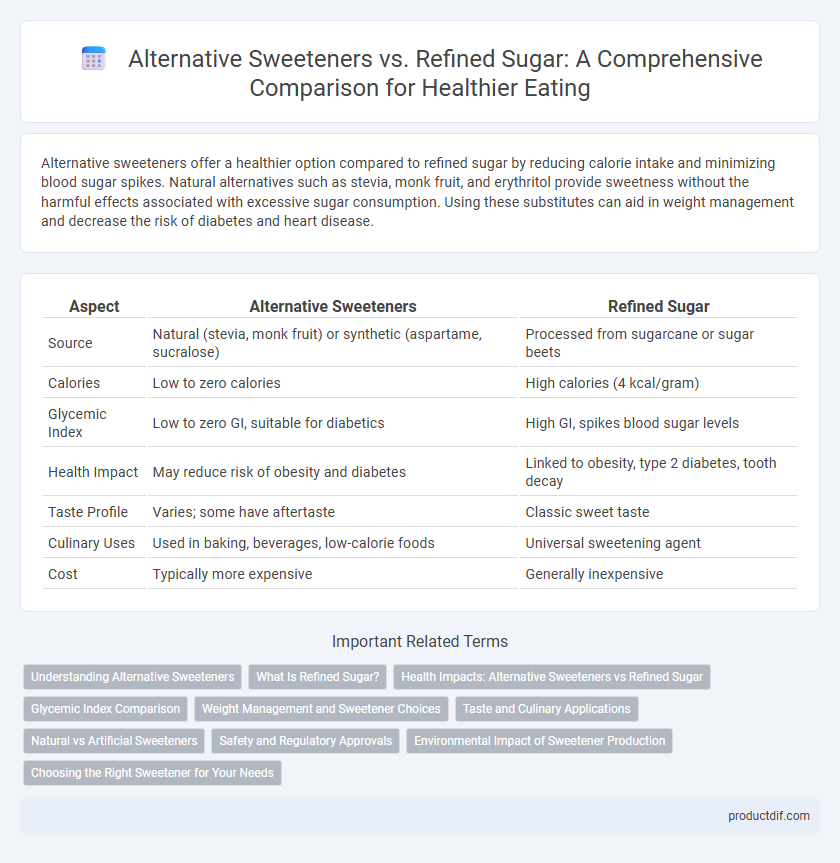Alternative sweeteners offer a healthier option compared to refined sugar by reducing calorie intake and minimizing blood sugar spikes. Natural alternatives such as stevia, monk fruit, and erythritol provide sweetness without the harmful effects associated with excessive sugar consumption. Using these substitutes can aid in weight management and decrease the risk of diabetes and heart disease.
Table of Comparison
| Aspect | Alternative Sweeteners | Refined Sugar |
|---|---|---|
| Source | Natural (stevia, monk fruit) or synthetic (aspartame, sucralose) | Processed from sugarcane or sugar beets |
| Calories | Low to zero calories | High calories (4 kcal/gram) |
| Glycemic Index | Low to zero GI, suitable for diabetics | High GI, spikes blood sugar levels |
| Health Impact | May reduce risk of obesity and diabetes | Linked to obesity, type 2 diabetes, tooth decay |
| Taste Profile | Varies; some have aftertaste | Classic sweet taste |
| Culinary Uses | Used in baking, beverages, low-calorie foods | Universal sweetening agent |
| Cost | Typically more expensive | Generally inexpensive |
Understanding Alternative Sweeteners
Alternative sweeteners such as stevia, erythritol, and monk fruit offer lower-calorie or zero-calorie options compared to refined sugar, making them popular choices for reducing overall sugar intake. These sweeteners have varying impacts on blood glucose levels, with many classified as low glycemic index, which benefits diabetics and those seeking blood sugar control. Understanding the chemical composition and metabolic effects of alternative sweeteners helps consumers make informed dietary decisions that support weight management and metabolic health.
What Is Refined Sugar?
Refined sugar, primarily sucrose derived from sugar cane or sugar beets, undergoes extensive processing to remove molasses and impurities, resulting in a highly concentrated sweetener. This form of sugar provides empty calories with minimal nutritional value and rapidly affects blood glucose levels, contributing to metabolic issues when consumed in excess. Due to its high glycemic index, refined sugar is linked to increased risks of obesity, type 2 diabetes, and cardiovascular disease.
Health Impacts: Alternative Sweeteners vs Refined Sugar
Alternative sweeteners such as stevia, erythritol, and monk fruit provide lower-calorie options that minimize blood sugar spikes compared to refined sugar, which is linked to increased risk of obesity, type 2 diabetes, and cardiovascular disease. Refined sugar consumption contributes to inflammation, insulin resistance, and fatty liver disease, whereas many alternative sweeteners show neutral or beneficial metabolic effects in clinical studies. Long-term use of low-glycemic sweeteners improves glycemic control and supports weight management, highlighting their potential health advantages over traditional refined sugar.
Glycemic Index Comparison
Alternative sweeteners such as stevia, erythritol, and monk fruit generally have a glycemic index (GI) close to zero, making them ideal for blood sugar management compared to refined sugar, which has a GI around 65. Consuming low-GI sweeteners helps prevent rapid spikes in blood glucose levels, beneficial for individuals with diabetes or those seeking to maintain stable energy. Choosing sweeteners with lower glycemic impact supports better metabolic health and reduces the risk of insulin resistance.
Weight Management and Sweetener Choices
Alternative sweeteners such as stevia, erythritol, and monk fruit provide lower-calorie options compared to refined sugar, supporting effective weight management by reducing overall caloric intake. Refined sugar contributes to rapid blood sugar spikes and increased fat storage, which can hinder weight loss efforts and promote obesity. Choosing low-glycemic sweeteners helps maintain stable insulin levels and supports healthier metabolic function, making them preferable for those seeking sustainable weight control.
Taste and Culinary Applications
Alternative sweeteners often provide a variety of flavor profiles, ranging from slightly bitter to fruity, differing significantly from the straightforward sweetness of refined sugar. In culinary applications, alternative sweeteners like stevia and erythritol perform well in beverages and low-calorie desserts but may alter texture and browning compared to refined sugar's caramelizing properties. Refined sugar remains the preferred choice for baking and confectionery due to its consistent melting behavior and ability to enhance flavor depth and mouthfeel.
Natural vs Artificial Sweeteners
Natural sweeteners such as honey, maple syrup, and stevia offer a lower glycemic index and contain trace nutrients compared to refined sugar, which has high calories and causes rapid blood sugar spikes. Artificial sweeteners like aspartame and sucralose provide sweetness without calories but raise concerns about long-term health effects and gut microbiome disruption. Choosing natural alternatives can support better metabolic health and reduce the risk of chronic diseases linked to excessive refined sugar consumption.
Safety and Regulatory Approvals
Alternative sweeteners such as stevia, monk fruit, and erythritol have undergone rigorous safety assessments and received regulatory approvals from agencies like the FDA and EFSA, ensuring their safe consumption within established daily intake limits. In contrast, refined sugar, while widely used and generally recognized as safe, is linked to health risks when consumed excessively, prompting recommendations to limit intake. Regulatory bodies continue to monitor both alternative sweeteners and refined sugar to uphold public health standards.
Environmental Impact of Sweetener Production
Alternative sweeteners such as stevia, monk fruit, and erythritol typically have a lower environmental footprint compared to refined sugar, requiring less water and land during cultivation. Refined sugar production often involves intensive agricultural practices, leading to deforestation, soil degradation, and significant greenhouse gas emissions. Choosing plant-based sweeteners contributes to sustainable food systems by minimizing resource use and reducing carbon emissions associated with traditional sugar farming.
Choosing the Right Sweetener for Your Needs
Alternative sweeteners like stevia, monk fruit, and erythritol offer lower glycemic impact and fewer calories compared to refined sugar, making them suitable for diabetics and weight-conscious individuals. Refined sugar provides consistent sweetness and texture but can contribute to health issues such as obesity and insulin resistance when consumed in excess. Selecting the right sweetener depends on dietary goals, taste preferences, and any medical conditions, with natural and minimally processed options generally favored for healthier outcomes.
Alternative Sweeteners vs Refined Sugar Infographic

 productdif.com
productdif.com